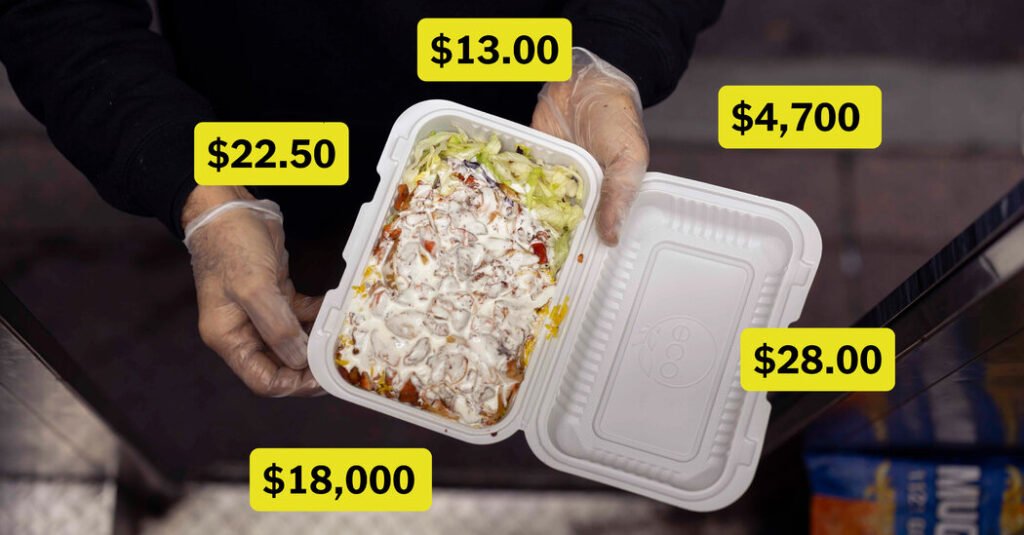However Mr. Mousa targeted on one quantity: 3,892. That was his place on a New York Metropolis meals vendor ready listing.
Like hundreds of the town’s cell meals distributors, Mr. Mousa can not get a allow for his cart, the Halal Plates. A longstanding cap restricted the variety of permits to five,100, earlier than a 2021 legislation started permitting for 445 new permits a 12 months for a decade. To date, the town has issued 71 new permits.
Nearly 9,500 folks had been on ready lists in January, in response to the town’s well being division. A spokesman mentioned it had launched 1,074 purposes — a allow prerequisite — for the reason that legislation was enacted, however most candidates had but to finish the method.
Whereas he waits, Mr. Mousa mentioned he and his enterprise companion pay $18,000 in money each two years to hire their allow from a Bronx cabdriver who Mr. Mousa mentioned obtained it many years in the past for a number of hundred {dollars}. Mr. Mousa mentioned such preparations had been the one methods many distributors, who in any other case comply with rules, can keep away from fines and confiscation of their carts.
Mr. Mousa hopes to barter the identical worth this summer season, however anticipates the allow holder will attempt to elevate it.
“What can I do?” Mr. Mousa mentioned, including, “He has the factor I want.”
Such is the mathematics of hen and rice — a closely spiced mound of boneless hen with yellow rice and a aspect salad — which swept the town within the Nineteen Eighties, after a wave of Egyptian immigrants arrived.
Mr. Mousa, 30 and likewise from Egypt, raised the dish’s worth by 67 % since 2020. He mentioned he closed the enterprise for over a 12 months, working as a meals supply driver.
Working the cart contains monitoring dozens of bills, beginning with saving $750 month-to-month for the allow. The enterprise, which depends on college students and workplace and building employees, operates in two 10-hour shifts, from 8:30 a.m. to 4:30 a.m. Within the winter, Mr. Mousa and two cooks (paid $150 a day) work Wednesday to Sunday; after Easter, they work on daily basis.
Mr. Mousa additionally pays $450 month-to-month for area in a storage and commissary kitchen in Pink Hook, Brooklyn, to retailer the cart and substances. He spends $30 a day for a employee to scrub the cart, and $65 to have a driver haul it to and from Decrease Manhattan.
A lot of the cooking occurs within the 5-by-10-foot metallic cart. A $2,000 generator powers a small fridge; the flattop grill and fryer burn by way of a $25 propane tank every day. An $18 bag of basmati rice is normally cooked by commissary employees.
Within the colder months, the enterprise may make $500 every day, Mr. Mousa mentioned — a internet loss, however sufficient to outlive till the summer season, when gross sales vary from $700 to $1,400 a day. Rooster over rice is the preferred dish, accounting for two-thirds of income.
New York is the one main American metropolis imposing a cap on meals vendor permits, mentioned John Rennie Brief, a professor emeritus on the College of Maryland, Baltimore County. However that would change.
In December, Metropolis Council members introduced a bill to extend the variety of new permits issued yearly — to 1,500 from 445 — and take away the cap after 5 years.
Mohamed Attia, the managing director of the Road Vendor Undertaking, an advocacy group, mentioned the modifications could be transformative.
Opponents say eliminating the cap might create overcrowding and questions of safety.
A spokeswoman for the mayor’s workplace mentioned the town was reviewing the laws.
For Mr. Mousa, who lives along with his spouse and child in Jersey Metropolis, N.J., a legit allow might save him vital quantities of cash. He mentioned he additionally has an possession stake in two carts close by that additionally use borrowed permits.
Sufficient financial savings, maybe, to kick-start his retirement. “In my 50s,” he mentioned, “I’ll be fishing on a lake.”
Produced by Eden Weingart, Andrew Hinderaker and Dagny Salas. Improvement by Gabriel Gianordoli and Aliza Aufrichtig.
